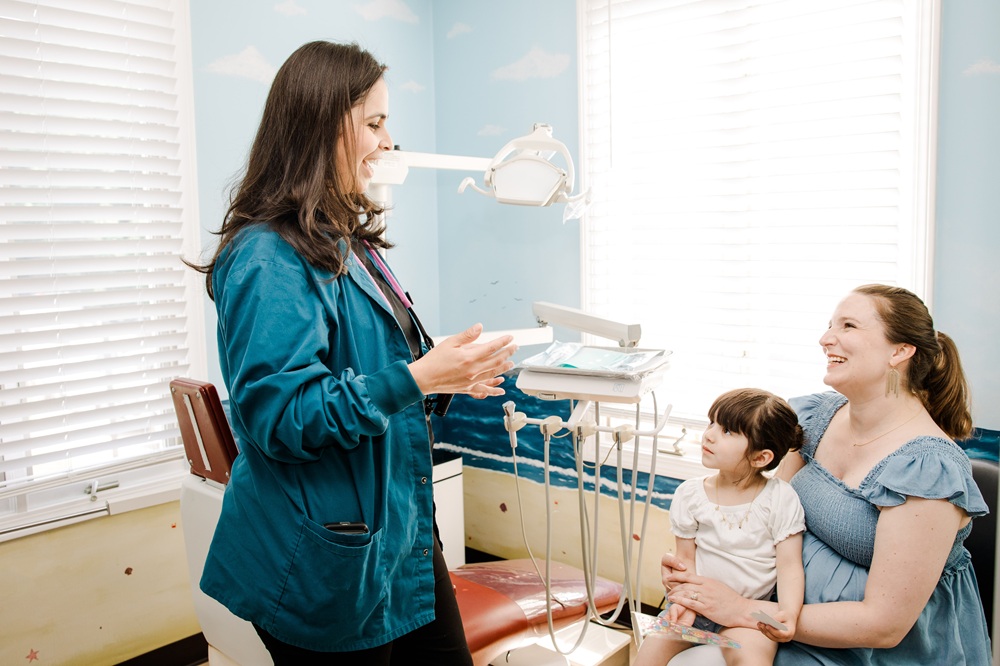
Infant Dentistry In North Dartmouth
Even tiny grins need some TLC! Set your baby’s smile up for a lifetime of thriving oral health with our specialized infant care.
Why should my baby see the dentist?
The American Academy of Pediatric Dentistry (AAPD) recommends children see the dentist by their first birthday. Primary or baby teeth typically begin to erupt by 6 months of age, and it’s important to have your infant’s first teeth examined by a board-certified pediatric dentist, like Dr. Sean or Dr. Karina, to ensure their oral health is on the right track.

The Benefits of Infant Dentistry
Establish A Dental Home
Fear and anxiety can occur when a toddler or child is unfamiliar with “going to the dentist”. By starting appointments early, you and your baby can get comfortable in our office, get to know our team, and feel at ease knowing we are here to provide comfortable, quality care.
Proper Nutrition Guidance
Your dentist will provide tips and recommendations on the best foods for your baby’s overall oral health. Our team will also go over important nutritional information, such as the negative effects of sugary drinks, gummy snacks, and putting a child to sleep with milk in their bottle.
Dental Hygiene Supervision
Caring for your baby’s smile is a bit different than caring for your own! We understand that it can be tough to brush their teeth, especially when they are not cooperative, but we’ll share strategies to make it fun for everyone!
The Infant Dentistry Treatment Process
Meeting You & Your Child
Your dentist will begin your child’s first appointment by getting to know you and your little one a little better. They may ask a few basic questions about your child’s oral health, such as when their first teeth came in and their current oral care routine. This information will allow your doctor to provide more specialized care.
Counting Your Baby’s Teeth
Next, your child’s dentist will “count” your infant’s teeth and examine their mouth, looking for any potential signs of developmental issues or decay. This will provide insights on how your child’s mouth is developing as they grow.
Examining Their Gums
Your dentist will also examine your child’s gums. While gum disease is rare in infants, inflammation and irritation can still occur, so it’s important to address these issues as soon as possible. Once the exam is finished, we will discuss with you your child’s oral health and offer advice on how to keep their teeth healthy.
Flexible Options for Every Age
Choose the Plan That Fits Your Child’s Needs
We are in-network with Delta Dental of MA and Blue Cross Blue Shield Indemnity Plan, and we accept and can submit claims to nearly all other insurances.
Whether you’ve got a teething toddler or a teen in braces, we also offer an in-house Savings Plan with three options tailored to each stage of your child’s dental development. *Program exclusions & limitations apply


Pediatric Plan
(3–7 years old)
(3–7 years old)
Total Plan Value: $686/year
Additional Member: $465/year

Adolescent Plan
(8 years old & up)
(8 years old & up)
Total Plan Value: $877/year
Additional Member: $600/year
Frequently Asked Questions
Check out these frequently asked questions, or call us to speak with our team.
The current recommendation of the AAPD (American Academy of Pediatric Dentistry) is that you take your child to the dentist for an appointment whenever their first tooth erupts or when they reach the age of 1, whichever happens first. While this may seem early, seeing a dentist regularly and establishing a “dental home” early has a number of great benefits.
A “dental home” is the dental office where your child will receive the majority of their dental care as they grow. There are a few reasons why a dental home is important. First, your child will be able to develop a real, meaningful relationship with their dentist and the staff at our office. They will feel safer and more comfortable during their appointment, and become more familiar with the basics of dentistry. This can help reduce feelings of discomfort, fear, and anxiety, and prevent them from developing dental anxiety later in life.
In addition, if your child sees the same dentist regularly, they will receive more productive dental care. Their pediatric dentist will understand the unique oral health challenges your child may face, and will be able to take steps to provide specialized care. For example, if your child is cavity-prone and develops tooth decay at a young age, their doctor may recommend a more diligent at-home oral care routine, along with regular fluoride treatments and/or dental sealants.
Yes, X-rays are safe for children of all ages. The latest X-ray technology uses minimal radiation, and all patients are given protective equipment to reduce their exposure. That said, your child will only need to get X-rays if their dentist believes they may have a hidden dental issue that can’t be detected with a visual exam alone.
Baby teeth fall out naturally, so why is it so important to keep your child’s baby teeth healthy? Well, decayed and damaged baby teeth can be very painful and uncomfortable, and lead to serious oral health complications, just like adult teeth.
Beyond this, the baby teeth provide the “path” that the adult teeth will follow when they begin to erupt. If your child’s baby teeth are decayed or they lose a baby tooth earlier than they’re supposed to, this could lead to further oral development issues as your child grows.

.webp)


